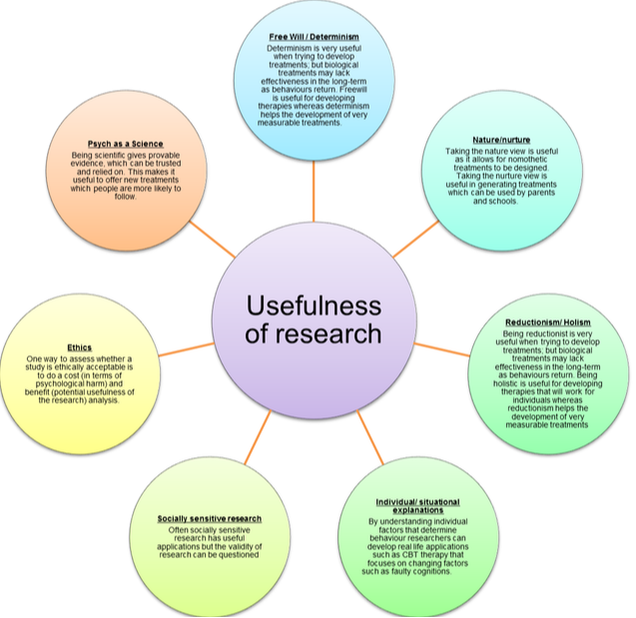Summary of the Debate
Usefulness of Research = research is useful if it (D.R.U.G.V.)
- develops therapies, interventions, preventative action or treatments
- provokes further research in the field
- progresses understanding beyond previous findings
- is generalisable to a wide population
- is valid so that results are accurate
| comparing_the_debates.pptx | |
| File Size: | 189 kb |
| File Type: | pptx |
Comparing the Debate with Other Debates
Free Will / Determinism
Determinism is very useful when trying to develop treatments; but biological treatments may lack effectiveness in the long-term as behaviours return. Freewill is useful for developing therapies whereas determinism helps the development of very measurable treatments.
Nature/nurture
Taking the nature view is useful as it allows for nomothetic treatments to be designed. Taking the nurture view is useful in generating treatments which can be used by parents and schools.
Reductionism/ Holism
Being reductionist is very useful when trying to develop treatments; but biological treatments may lack effectiveness in the long-term as behaviours return. Being holistic is useful for developing therapies that will work for individuals whereas reductionism helps the development of very measurable treatments
Individual/ situational explanations
By understanding individual factors that determine behaviour researchers can develop real life applications such as CBT therapy that focuses on changing factors such as faulty cognitions.
Socially sensitive research
Often socially sensitive research has useful applications but the validity of research can be questioned
Ethics
One way to assess whether a study is ethically acceptable is to do a cost (in terms of psychological harm) and benefit (potential usefulness of the research) analysis.
Psych as a Science
Being scientific gives provable evidence, which can be trusted and relied on. This makes it useful to offer new treatments which people are more likely to follow.
Free Will / Determinism
Determinism is very useful when trying to develop treatments; but biological treatments may lack effectiveness in the long-term as behaviours return. Freewill is useful for developing therapies whereas determinism helps the development of very measurable treatments.
Nature/nurture
Taking the nature view is useful as it allows for nomothetic treatments to be designed. Taking the nurture view is useful in generating treatments which can be used by parents and schools.
Reductionism/ Holism
Being reductionist is very useful when trying to develop treatments; but biological treatments may lack effectiveness in the long-term as behaviours return. Being holistic is useful for developing therapies that will work for individuals whereas reductionism helps the development of very measurable treatments
Individual/ situational explanations
By understanding individual factors that determine behaviour researchers can develop real life applications such as CBT therapy that focuses on changing factors such as faulty cognitions.
Socially sensitive research
Often socially sensitive research has useful applications but the validity of research can be questioned
Ethics
One way to assess whether a study is ethically acceptable is to do a cost (in terms of psychological harm) and benefit (potential usefulness of the research) analysis.
Psych as a Science
Being scientific gives provable evidence, which can be trusted and relied on. This makes it useful to offer new treatments which people are more likely to follow.

